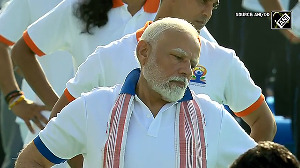US-based pharma multinational Merck's tie-up with two insurance companies to sell its branded simvastatin, Zocor, has helped the innovator company price its branded drug at a level lower than the generic versions in the US market.
Dr Reddy's and Ranbaxy, two Indian companies now entitled to sell generic simvastatin in the US market, say they do not see it as a threat. Analysts, however, agree that Merck's move - the latest in a series of barriers that Big Pharma is erecting for generics - will erode margins further.
Merck's tie-up with UnitedHealth Group Inc and WellPoint has enabled it to reduce Zocor's prices by 40 per cent, setting the benchmark for generic companies. Industry estimates have pegged the extent of influence of the two US insurers at about 20 per cent of the market.
"Lowering the price is only a short-term move to create artificial barriers for generics. It not only makes a dent in the 180-day exclusivity period (which is granted to a successful generic challenge under Para IV) but also compels generics companies to aggressively price the drug, and invest heavily in the distribution network," says Sanjay Aggarwal, pharma analyst with KPMG.
"What distinguishes an innovator from generics if not the price? If this difference was to be scrapped, generics are bound to be hurt," adds another analyst.
A Ranbaxy spokesperson, however, said Merck's arrangement with the insurance companies was a specific one, and would not much impact the Indian company's pricing strategy.
"By putting the branded drug on an equal footing with the generics, Merck has ensured that at least a slice of the market is not genericised. It robs the 180-day exclusivity of its charm; but, I doubt if it would become a trend," said G V Prasad, vice-chairman & chief executive officer, Dr Reddy's Labs.
Merck's patent on $4.6-billion cholesterol drug simvastatin expired on June 23 this year, with Ranbaxy Laboratories winning the exclusivity for 80 mg strength, and Teva on all the others. Dr Reddy's Labs is Merck's authorised generics partner.
"What if Pfizer tries a similar strategy? What happens to the Para IV challenger and his huge expenses, then?" wonders Sanjiv Kaul, managing director of Chrys Capital.
This trend (of insurance tie-ups) would only catch on as insurance companies were set to emerge as big pharma customers and become strong negotiators, adds Aggarwal.






